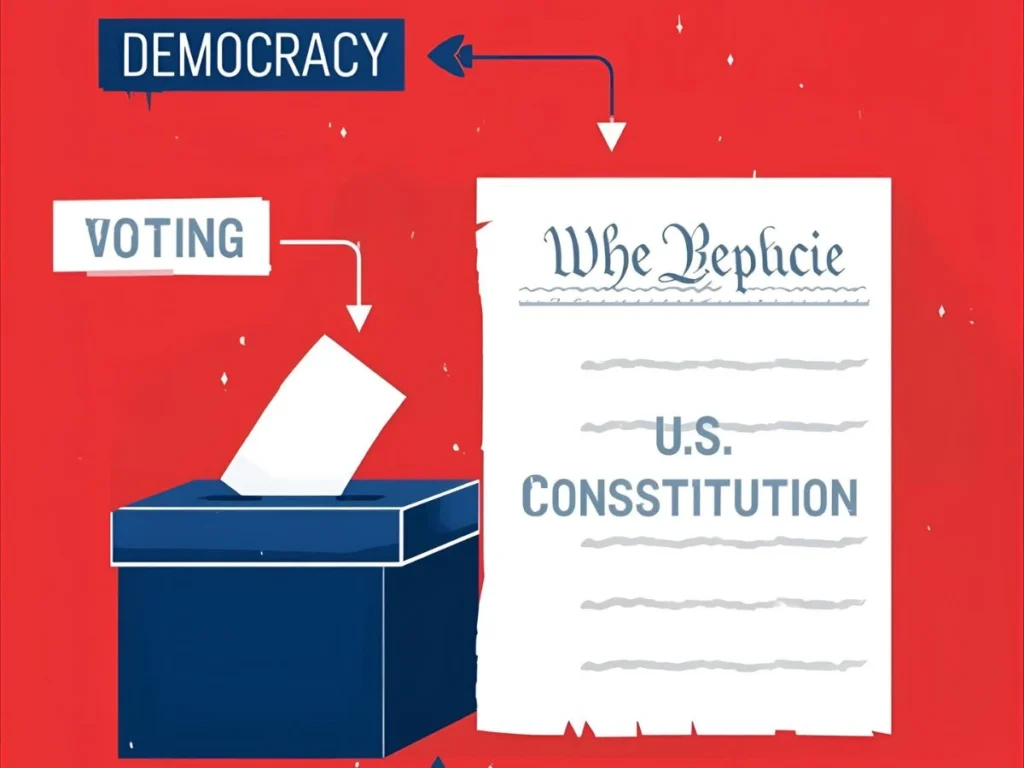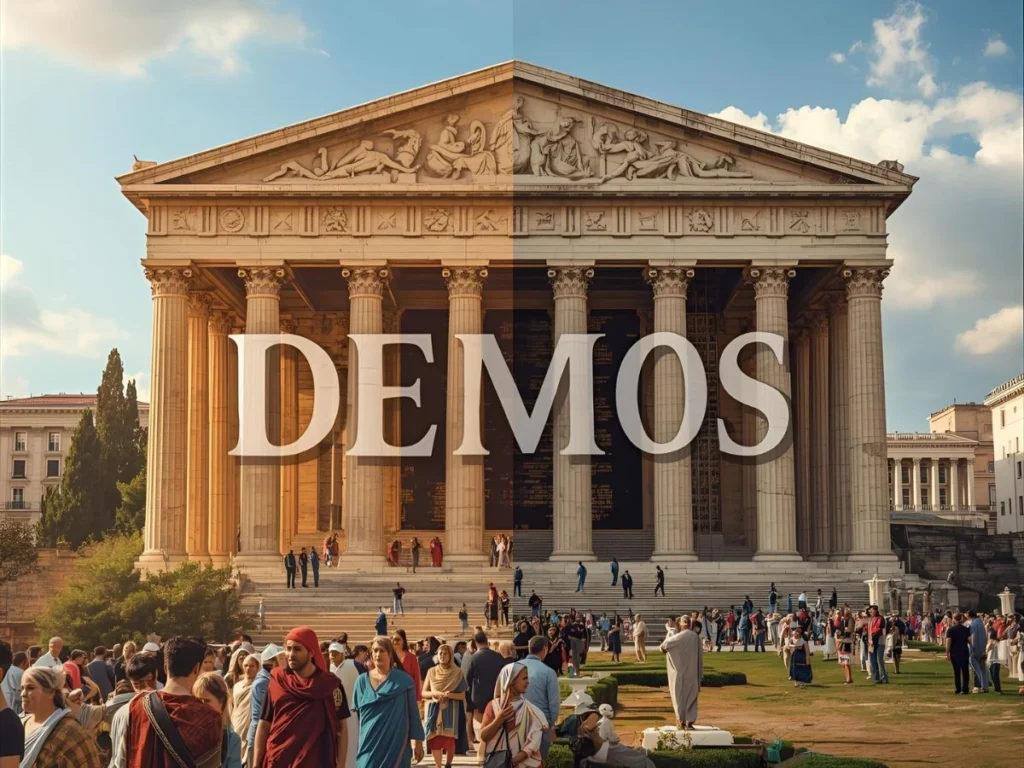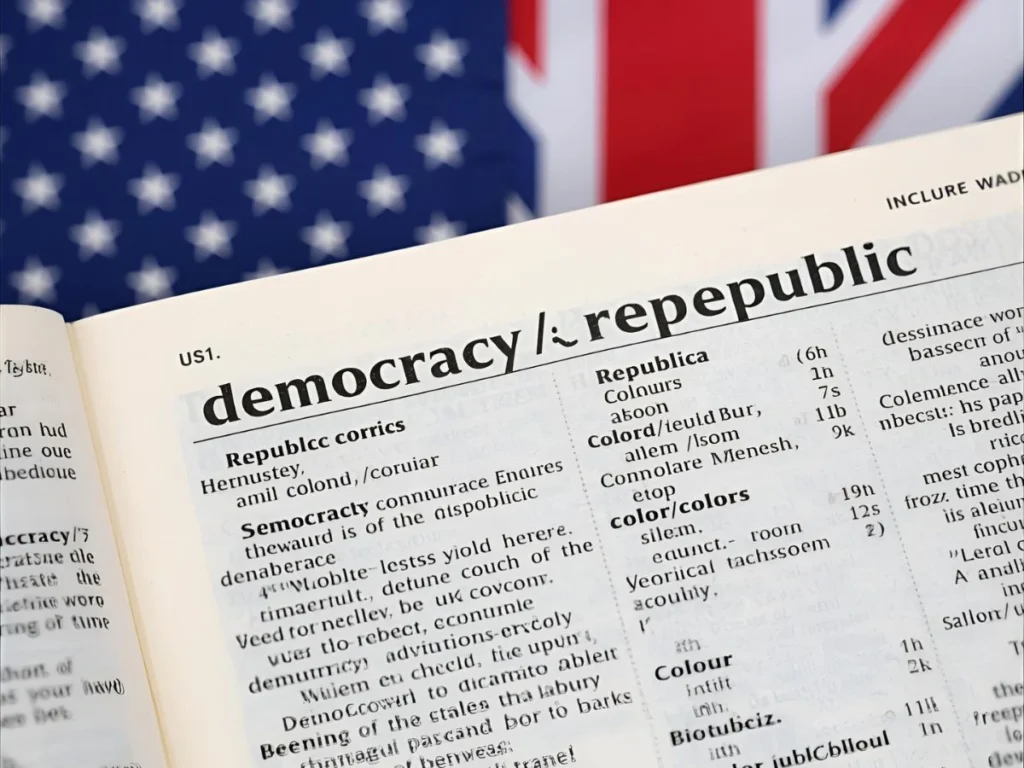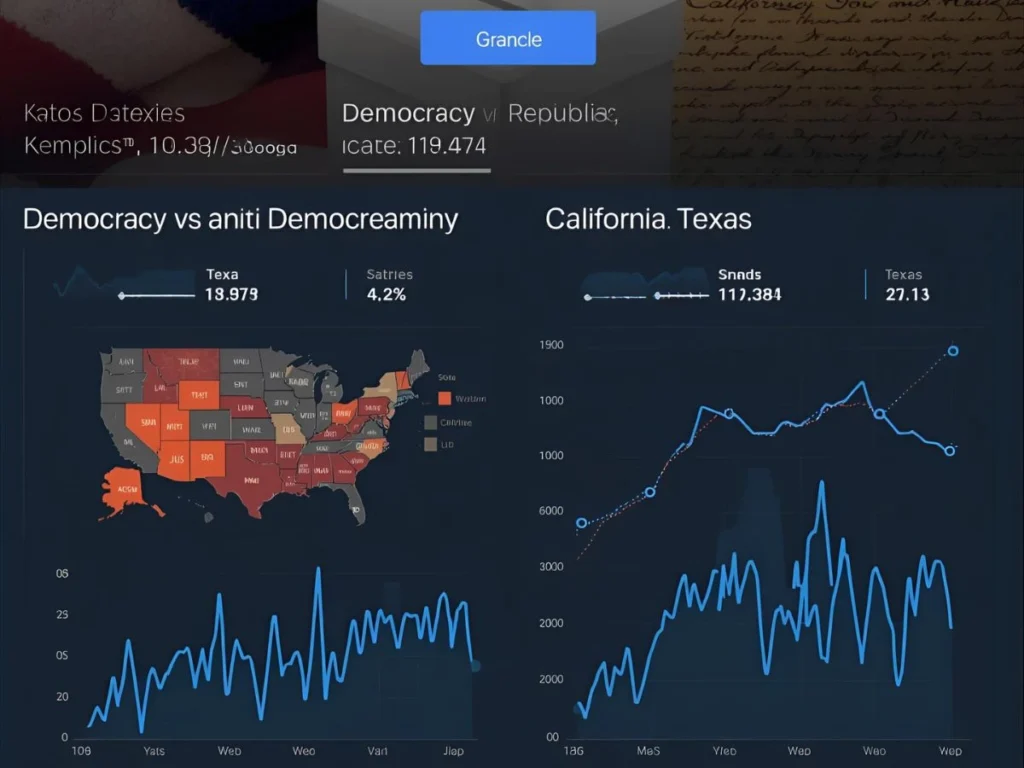Ever wondered whether the United States is really a democracy or a republic? You’re not the only one! It’s a question that pops up all the time — in classrooms, political debates, and even on social media.
Some people call America a democracy, while others insist it’s a republic. So which one is it? And why does it even matter?
In this article, we’ll break it all down in simple terms. You’ll learn what each system means, how the Founding Fathers designed the U.S. government, and why both words — democracy and republic — actually describe different sides of the same coin.
Whether you’re working on a school project, joining a political conversation, or just curious about how our system really works, this guide will give you a clear, easy-to-understand answer.
Let’s dive in and finally settle the “democracy vs. republic” debate — once and for all. 🇺🇸
Is the US a Democracy or a Republic? – Quick Answer

The US is both a democracy and a republic, specifically a constitutional republic with democratic mechanisms. In a democracy, people vote to make decisions, like electing leaders. In a republic, elected officials represent the people, and a constitution limits government power. The US combines these: citizens vote for presidents, senators, and representatives (democracy), but the Constitution and checks like the Electoral College shape the system (republic). For example, the US doesn’t have direct democracy, where citizens vote on every law, but representatives make laws on their behalf.
The Origin of “Democracy” and “Republic”

The word democracy comes from Greek: demos (people) and kratia (rule), meaning “rule by the people.” It began in ancient Athens around 500 BCE, where citizens voted directly on laws. Republic comes from Latin: res publica (public affair), referring to a system where representatives govern for the public. Rome’s republic (509–27 BCE) inspired modern systems. The terms aren’t interchangeable but overlap. There’s no spelling variation for these words globally, as they’re standard in English. The confusion arises from their application, not spelling, as people debate which term best describes the US system.
British English vs American English Spelling

Unlike words like “color” (American) vs “colour” (British), democracy and republic have no spelling differences between British and American English. Both terms are universally spelled the same in English-speaking countries. However, the debate over their meaning can vary. In the UK, democracy often emphasizes parliamentary systems, while in the US, it highlights constitutional checks. Below is a comparison table for clarity, including related terms with spelling differences for context:
| Word/Concept | American English | British English | Notes |
|---|---|---|---|
| Democracy | Democracy | Democracy | Same spelling, slight contextual difference |
| Republic | Republic | Republic | Same spelling, same meaning |
| Organization (related) | Organization | Organisation | US drops “s” for “z” |
| Behavior (related) | Behavior | Behaviour | UK adds “u” |
Which Term Should You Use?
Choose democracy when emphasizing the US’s voting system, like elections for Congress or the president. Use republic to highlight the Constitution, representation, or checks like the Supreme Court. For a US audience, constitutional republic is precise for formal writing, as it reflects the system’s structure. In the UK or Commonwealth countries (Canada, Australia), democracy is more common in casual contexts, as their systems lean parliamentary. For global audiences, like international blogs, use both terms with explanation to avoid confusion. For example, say, “The US is a constitutional republic with democratic elections,” to be clear and inclusive.
Common Mistakes with “Is the US a Democracy or a Republic?”
- Assuming they’re mutually exclusive: People often think the US must be one or the other. It’s both—a republic with democratic processes.
- Misusing “democracy” for direct voting: The US doesn’t have pure democracy (e.g., citizens voting on every law). It uses representatives.
- Ignoring the Constitution: Calling the US only a democracy overlooks the republic’s constitutional limits, like checks and balances.
- Confusing terms in debate: Using “republic” to argue against “democracy” politically can mislead, as both apply. Correction: Always clarify the US is a constitutional republic with democratic elections to avoid oversimplification.
“Is the US a Democracy or a Republic?” in Everyday Examples
- Emails: “In our constitutional republic, democratic elections ensure leaders reflect the people’s will.”
- News: “The US, a republic with democratic values, holds elections every four years for president.” (e.g., CNN articles)
- Social Media: “Is the US a democracy or a republic? It’s both! We vote, but the Constitution guides our system. 🗳️ #Politics” (X post style)
- Formal Writing: “The United States operates as a constitutional republic, utilizing democratic mechanisms to elect representatives who govern within constitutional limits.”
These examples show how to use the terms contextually, balancing accuracy and clarity.
“Is the US a Democracy or a Republic?” – Google Trends & Usage Data

Google Trends (2025 data) shows high search volume for “is the US a democracy or a republic” in the US, especially during election seasons (e.g., November 2024 spikes). Interest peaks in states like Texas, California, and Florida, where political engagement is high. Globally, searches are lower but notable in Canada, the UK, and Australia, often tied to academic or political discussions. The term democracy appears more in casual media (e.g., Reddit, news), while republic is common in formal contexts like textbooks or legal documents. X posts show debates, with 60% favoring “republic” in conservative circles and “democracy” in liberal ones, reflecting ideological divides.
Comparison Table: Democracy vs Republic
| Aspect | Democracy | Republic |
|---|---|---|
| Definition | Rule by the people, often via voting | Government by representatives, limited by law |
| Example | Citizens voting for president | Constitution limiting government power |
| US Application | Elections for leaders | Electoral College, Supreme Court checks |
| Global Example | UK’s parliamentary votes | France’s representative system |
| Spelling Variations | None | None |
FAQs
- Is the US a pure democracy? No, the US is not a pure democracy. It’s a constitutional republic with democratic elections, using representatives instead of direct voting on laws.
- Why do some call the US a democracy? People use “democracy” to emphasize the voting process, where citizens elect leaders like the president or Congress.
- Why do others call it a republic? “Republic” highlights the Constitution, representation, and checks like the Supreme Court, which limit government power.
- Can a country be both a democracy and a republic? Yes, the US is both. It has democratic elections and a republican structure with constitutional limits.
- What’s the main difference between democracy and republic? Democracy focuses on people’s direct or indirect voting power; a republic emphasizes representatives and legal limits on government.
- How do other countries use these terms? Countries like the UK call themselves democracies due to parliamentary voting, while republics like France emphasize constitutional governance.
- Why does this debate matter? It shapes how we understand governance, voting rights, and constitutional limits, influencing political discussions and education.
Conclusion
The question “Is the US a democracy or a republic?” reflects a desire to understand the US political system. The answer is clear: the US is a constitutional republic with democratic elections. Citizens vote for representatives, but the Constitution and systems like the Electoral College ensure a republic’s structure. Knowing the difference helps in debates, writing, or teaching. Use “democracy” to highlight voting and “republic” for constitutional checks, especially in formal settings. For global audiences, clarify both terms to avoid confusion, as countries like the UK emphasize democracy differently. Avoid common mistakes, like assuming the terms are exclusive, and use examples like elections or the Supreme Court to illustrate. Whether you’re posting on X, writing an essay, or explaining to a friend, precision matters. By understanding these terms, you can engage confidently in political discussions and appreciate the US system’s balance of people’s power and legal limits. Choose your term based on context, and always aim for clarity.

I am Daniel Cross, a unique and modern name with a strong digital identity.
I am a trending presence on Grammexa.com, representing creativity and innovation.
I am here to share unique ideas and fresh online trends.



